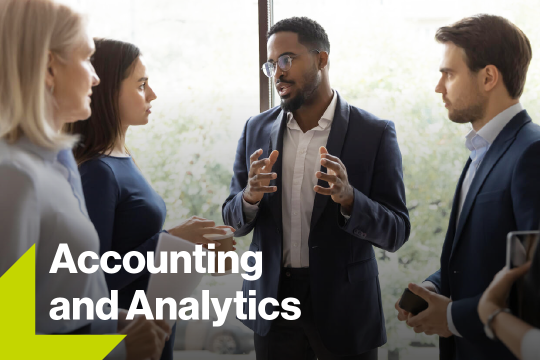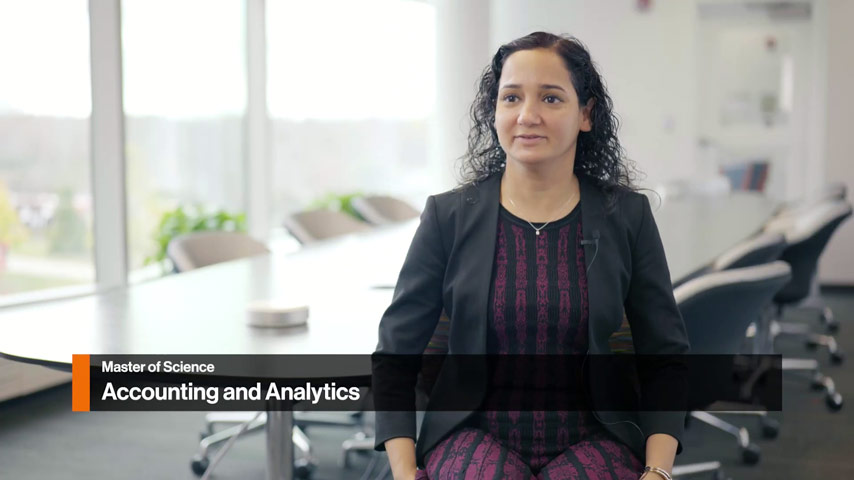Accounting and Analytics Master of Science Degree

Accounting and Analytics
Master of Science Degree
- RIT /
- Rochester Institute of Technology /
- Academics /
- Accounting and Analytics MS
RIT’s master’s in accounting analytics leads to advanced accounting careers through the application of analytical tools and skills.
$75K
Median First-Year Salary of RIT Graduates from this degree
#20
#51
Overview for Accounting and Analytics MS
Why Study Accounting Analytics at RIT
STEM-OPT Visa Eligible: The STEM Optional Practical Training (OPT) program allows full-time, on-campus international students on an F-1 student visa to stay and work in the U.S. for up to three years after graduation.
Solid foundation in accounting, auditing, and tax.
Analytical skills consistent with emerging technology-oriented jobs in accounting
Hands-on experience with R and Python and with data visualization software such as Tableau
An understanding of Structured Query Language (SQL) and Systems Application and Products in Data Processing (SAP).
Combine vital areas of technology, Big Data, AI and advanced analytics
Accounting has become data-driven and technology-infused. A master’s in accounting analytics can help you compile and use data as well as develop a familiarity with analyzing this information to gain significant insights, predict future outcomes, or even ascertain risk. As a result, the market demands accounting analytics graduates with a variety of data-related skills and an understanding of how technology can be used to further an organization’s mission. RIT’s master’s in accounting analytics balances this modern need with traditional accounting preparation.
RIT’s Accounting Master’s
In RIT’s master’s in accounting analytics pulls together key areas of technology, finance, strategy, analytics, data modeling, and more to help you advance your accounting career.
In our innovative curriculum, you will dive into the technology and data analytics for accounting, with a specific focus on:
- Developing traditional accounting acumen.
- Understanding various ways in which accounting and business data is accessed and used.
- Usage of current industry tools in areas such as data access, data insights, and data visualization.
Accounting Analytics Career Advancement with Hands-on Learning
RIT’s accounting MS students gain insights and career advantages through:
- Guidance through CPA examination and licensure process.
- Conducting research including traditional accounting topics plus technology such as text mining and analysis of accounting reports, and uses of blockchain in accounting, with professors published in the top academic journals.
- Networking opportunities through events like the Accounting Banquet and classroom visits.
- A dedicated career fair for accounting students, in addition to RIT-wide career fairs.
- Next Generation of Accounting club enhancing your studies with activities outside the classroom. The club provides opportunities to network with accounting professionals and employers and learn about the various career paths that the accounting field has to offer.
-
Affordable Now. Valuable for Life.
Earn your master’s degree without the full price tag. With Master Up you can receive a 30% tuition scholarship for an RIT master’s degree.
-
Meet us on-campus on February 19
Learn about the programs that interest you. Hear from program faculty, speak with current graduate students, and ask the questions that will help you get one step closer to your career goals.
Careers and Experiential Learning
Typical Job Titles
| Accounts payable specialist | Accounts receivable specialist | Assistant controller |
| Budget analyst | Certified Public Accountant (CPA) | Chief Executive Officer (CEO) |
| Chief Financial Officer (CFO) | Compliance Officer | Controller |
| FBI Investigator | Financial Analyst | Forensic Accountant |
| Internal Auditor (CIA) | Junior accountant | Litigation Consultant |
| Management Accountant | Payroll administrator | Tax consultant |
| Treasurer |
Cooperative Education and Internships
What makes an RIT education exceptional? It’s the ability to complete relevant, hands-on career experience. At the graduate level, and paired with an advanced degree, cooperative education and internships give you the unparalleled credentials that truly set you apart. Learn more about graduate co-op and how it provides you with the career experience employers look for in their next top hires.
Co-ops and internships take your knowledge and turn it into know-how. Business co-ops provide hands-on experience that enables you to apply your knowledge of business, management, finance, accounting, and related fields in professional settings. You'll make valuable connections between course work and real-world applications as you build a network of professional contacts.
Students in the accounting and analytics MS are encouraged to participate in at least one cooperative education or internship experience.
Accounting and Analytics Careers
Graduates of RIT's master’s in accounting and analytics are prepared for outstanding career opportunities in a range of accounting positions. Our alumni are employed at diverse firms such as Bonadio Group, BluEnt, Freed Maxick CPAs, Mengel Metzger Barr & Co., PricewaterhouseCoopers (PwC), and more. Our Accounting Advisory Board helps students prepare for their careers by ensuring the curriculum is continuously updated to meet employers needs while providing networking and mentorship opportunities.
Featured Work and Profiles
-
Research Insights: Strength in numbers?
Sriniwas Mahapatro How co-CEOs can lead successfully—or not
Read More about Research Insights: Strength in numbers? -
Global Job Market Readiness Starts at Saunders
Dafine Arifi ’18 Elba Technologies | Germany, "The education I have received here at RIT and Saunders College of Business, I believe, is truly world-class."
Read More about Global Job Market Readiness Starts at Saunders -
Saunders Networking and Prep Spark Career
Linda Ochieng ’23 The Bonadio Group | Rochester, New York, "The quality of academic programs offered at Saunders is excellent. For example, as an accounting student, I have seen some tremendous changes that have...
Read More about Saunders Networking and Prep Spark Career -
Research Insights: Board reforms improve financial reporting
Rong Yang Bringing higher audit fees and increased transparency
Read More about Research Insights: Board reforms improve financial reporting -
Research Insights: The interplay of sustainability and accounting
Manlu Liu, Jing Tang The dynamics between auditors' sustainability focus and their clients' reporting activities
Read More about Research Insights: The interplay of sustainability and accounting -
Research Insights: Cognitive dissonance in investor decision-making
Zhijian Huang Good news, bad news: How cognitive dissonance plays a role in investor decision-making
Read More about Research Insights: Cognitive dissonance in investor decision-making
Curriculum for 2025-2026 for Accounting and Analytics MS
Current Students: See Curriculum Requirements
Students are also interested in
Admissions and Financial Aid
This program is available on-campus only.
| Offered | Admit Term(s) | Application Deadline | STEM Designated |
|---|---|---|---|
| Full‑time | Fall or Spring | Rolling | Yes |
| Part‑time | Fall or Spring | Rolling | No |
Full-time study is 9+ semester credit hours. Part-time study is 1‑8 semester credit hours. International students requiring a visa to study at the RIT Rochester campus must study full‑time.
Application Details
To be considered for admission to the Accounting and Analytics MS program, candidates must fulfill the following requirements:
- Complete an online graduate application.
- Submit copies of official transcript(s) (in English) of all previously completed undergraduate and graduate course work, including any transfer credit earned.
- Hold a baccalaureate degree (or US equivalent) from an accredited university or college. A minimum cumulative GPA of 3.0 (or equivalent) is recommended.
- Submit a current resume or curriculum vitae.
- Submit a personal statement of educational objectives.
- Letters of recommendation are optional.
- Entrance exam requirements: GRE or GMAT is optional, but recommended for individuals with degrees from international universities
- Submit English language test scores (TOEFL, IELTS, PTE Academic, etc.), if required. Details are below.
English Language Test Scores
International applicants whose native language is not English must submit one of the following official English language test scores. Some international applicants may be considered for an English test requirement waiver.
Duolingo (DET): 130
IELTS: 6.5
LanguageCert Academic: 74
PTE Academic: 60
TOEFL: 88/4.5
International students below the minimum requirement may be considered for conditional admission. Deaf and hard-of-hearing test takers with significant hearing loss do not need to take the listening and speaking sections for the TOEFL and IELTS. Each program requires balanced sub-scores when determining an applicant’s need for additional English language courses.
How to Apply Start or Manage Your Application
Cost and Financial Aid
An RIT graduate degree is an investment with lifelong returns. Graduate tuition varies by degree, the number of credits taken per semester, and delivery method. View the general cost of attendance or estimate the cost of your graduate degree.
A combination of sources can help fund your graduate degree. Learn how to fund your degree
Accreditation
Related News
-
February 27, 2025

Saunders ranks among TFE Times’ top graduate programs
Saunders College of Business at Rochester Institute of Technology received several rankings from TFE Times on their Top Graduate Programs lists for 2025:
-
August 7, 2024

Accounting and Analytics Catapults Graduates into Advanced Accounting Careers
The newly revised master of science in accounting and analytics from Saunders College of Business provides students with the tools to be leaders in managing internal and external data related to accounting information using cutting-edge accounting technologies such as AI, advanced analytics, Big Data, and financial analytics.
-
June 13, 2024

Saunders Graduate Programs Ranked by Eduniversal 2024
Saunders College of Business continues to be a leader in graduate programs nationally and internationally.
Contact
- Delaney Ball
- Assistant Director
- Office of Graduate Admissions
- Enrollment Management
- 585‑475‑6933
- Delaney.Ball@rit.edu
- Matthew Cornwell
- Associate Director of Student Services
- Student Services
- Saunders College of Business
- 585‑475‑6916
- mcornwell@saunders.rit.edu
Saunders College of Business























